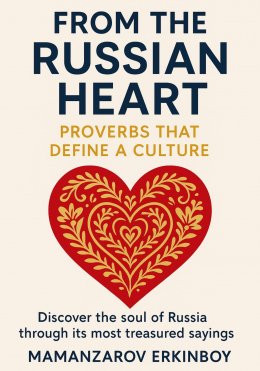Читать онлайн From the Russian Heart: Proverbs That Define a Culture

Introduction: The Soul of a Nation in Its Sayings
In the vast expanse of the Russian landscape, from the golden wheat fields of the south to the frozen tundra of Siberia, one thing has remained constant throughout centuries of change: the wisdom embedded in Russian proverbs. These brief, powerful sayings—known as пословицы (poslovitsy)—are far more than quaint folk expressions. They are the distilled essence of Russian experience, the cultural DNA that has shaped how Russians think, feel, and understand the world around them.
What Are Russian Proverbs?
Russian proverbs are short, memorable statements that express universal truths through the lens of Russian experience. Unlike simple idioms or colorful expressions, proverbs carry moral weight and practical wisdom. They serve as a collective memory bank, preserving the accumulated knowledge of generations who faced harsh winters, political upheavals, economic hardships, and the eternal human struggles of love, work, and survival.
Each proverb is a compressed story, containing within its few words the wisdom of countless experiences. When a Russian grandmother tells her grandson "Утро вечера мудренее" (Morning is wiser than evening), she's not just suggesting he sleep on a decision—she's passing down centuries of understanding about human nature, the value of reflection, and the clarity that comes with rest.
The Historical Journey of Russian Proverbs
Russian proverbs have their roots in the earliest Slavic traditions, long before the formation of the Russian state. In pre-literate societies, these sayings served as portable libraries, carrying essential knowledge from generation to generation. They were the textbooks of everyday life, teaching everything from agricultural wisdom to social behavior.
During the medieval period, Russian proverbs absorbed influences from Byzantine Christianity, adding moral and spiritual dimensions to practical folk wisdom. The Orthodox faith didn't replace these ancient sayings but instead blended with them, creating a unique synthesis of earthly pragmatism and spiritual insight.
The 18th and 19th centuries saw the first systematic collection of Russian proverbs. Scholars like Vladimir Dal gathered thousands of these sayings, recognizing them as vital components of Russian culture. Writers such as Alexander Pushkin and Leo Tolstoy incorporated proverbs into their works, understanding that these folk expressions captured something essential about the Russian character that formal literature alone could not convey.
The Soviet era brought both challenges and reinforcement to proverbial wisdom. While some traditional sayings were discouraged as "backwards," others were embraced and new ones emerged that reflected socialist values. Proverbs about work, collective effort, and perseverance found new relevance in an industrializing nation.
Why Russian Proverbs Matter Today
In our globalized world, Russian proverbs offer something increasingly rare: deep cultural authenticity. They provide windows into a worldview shaped by unique historical experiences—the vastness of Russian geography, the harshness of its climate, the complexity of its social structures, and the resilience of its people.
For language learners, understanding Russian proverbs is crucial for true cultural fluency. You might master Russian grammar and vocabulary, but without grasping these fundamental expressions of Russian thought, you'll miss the deeper currents of conversation and the subtle ways Russians communicate values, expectations, and worldviews.
For anyone interested in Russian culture—whether through literature, business, diplomacy, or simple curiosity—proverbs provide essential context. They explain why Russians value patience and endurance, why they prioritize relationships over efficiency, why they approach time differently than Western cultures, and why they maintain such strong connections to homeland and family.
The Structure of Russian Wisdom
Russian proverbs typically employ several distinctive features that make them both memorable and profound:
Metaphorical Language: Russian proverbs frequently use vivid iry drawn from nature, rural life, and everyday objects. "Время не птица – за хвост не поймаешь" (Time is not a bird—you can't catch it by the tail) transforms the abstract concept of time into a concrete, relatable i.
Rhythmic Structure: Many Russian proverbs have a musical quality, with rhyme, alliteration, or rhythmic patterns that make them easy to remember and pleasant to speak.
Moral Weight: Unlike simple observations, Russian proverbs typically carry ethical implications. They don't just describe what is, but suggest what should be.
Universal Application: While rooted in specific Russian experiences, these proverbs address universal human situations—work, friendship, family, time, money, and life's inevitable challenges.
Themes That Define Russian Character
The proverbs in this book are organized around the central themes that have shaped Russian culture for centuries:
Time and Patience: Russians have a complex relationship with time, viewing it as both precious and something that cannot be rushed. Their proverbs reflect a culture that has learned to endure, to wait for the right moment, and to trust in the natural unfolding of events.
Work and Labor: The Russian work ethic, forged through centuries of agricultural life and reinforced during industrialization, emphasizes that meaningful work is both a moral obligation and a path to personal fulfillment.
Homeland and Belonging: The concept of родина (rodina—homeland) runs deep in Russian consciousness. These proverbs reveal an emotional attachment to place that goes far beyond mere patriotism.
Family and Relationships: Russian proverbs show how relationships—especially family bonds and deep friendships—are considered life's most valuable treasures, more important than material wealth.
Wisdom and Learning: Education and intellectual development are highly valued, but Russian proverbs emphasize that true wisdom comes from experience combined with reflection.
How to Use This Book
Each proverb in this collection is presented with five essential components: the original Russian text, its English meaning, historical and cultural background, equivalent English expressions, and practical examples of usage. This structure allows you to understand not just what Russians say, but why they say it and how these expressions fit into broader patterns of Russian thought.
Whether you're a student of Russian language, a business person working with Russian colleagues, a traveler preparing to visit Russia, or simply someone fascinated by the wisdom of different cultures, these proverbs will deepen your understanding of what makes Russians uniquely Russian.
The proverbs collected here represent the heart of Russian wisdom—tested by time, refined by experience, and passed down through generations who understood that the deepest truths often come in the smallest packages. In learning these sayings, you're not just memorizing clever expressions; you're gaining access to the collective soul of one of the world's great cultures.
As Russians themselves say, "Пословица недаром молвится"—"A proverb is not spoken without reason." Each saying in this book has earned its place in Russian hearts and minds through centuries of lived experience. Now, they invite you to share in that wisdom and discover the profound insights that emerge from the Russian heart.
Proverbs about Time (Пословицы о времени)
Russian Proverb: Время краску с лица сгоняет
English Meaning: "Time drives the paint from one's face" – Everything passes and is forgotten with time
Origin/Background: This proverb reflects the Russian understanding that time erases both physical beauty and emotional pain. The metaphor of "paint" refers to both cosmetics and the natural color of youth, emerging from observations of how aging affects appearance and how grief eventually fades.
English Equivalent: "Time heals all wounds," "This too shall pass"
Example: After her divorce, Maria was devastated, but her grandmother reminded her that время краску с лица сгоняет – in a few years, the pain would fade and she'd find happiness again. Russian Proverb: Время на время не приходится
English Meaning: "Time doesn't coincide with time" – Everything changes periodically, nothing can be predicted
Origin/Background: This proverb acknowledges life's unpredictability and the cyclical nature of fortune. It reflects Russian fatalism and acceptance that favorable and unfavorable periods alternate unpredictably, warning against assuming current conditions will continue forever.
English Equivalent: "The only constant is change," "You never know what tomorrow brings"
Example: The successful businessman lost everything in the economic crisis, but his friend reminded him время на время не приходится – fortunes change, and his luck could turn around again.
Russian Proverb: Время не дремлет, часы не стоят
English Meaning: "Time doesn't slumber, clocks don't stop" – Time passes quickly and irreversibly
Origin/Background: This saying emphasizes time's relentless march forward. The parallel structure of "time doesn't sleep" and "clocks don't stop" reinforces the idea that while we might rest or pause, time continues its steady progression without regard for human wishes or needs.
English Equivalent: "Time waits for no one," "Time marches on"
Example: Procrastinating on his thesis, Ivan suddenly realized время не дремлет, часы не стоят – months had passed while he delayed, and his deadline was approaching fast
Russian Proverb: Время не птица – за хвост не поймаешь
English Meaning: "Time is not a bird – you can't catch it by the tail" – Time cannot be stopped or captured
Origin/Background: This colorful metaphor comes from rural Russian life where catching birds was common. The i emphasizes time's elusive nature – just as a bird flies away when you try to grab it, time slips through our fingers no matter how desperately we try to hold onto it.
English Equivalent: "Time flies," "You can't turn back the clock"
Example: Viktor kept postponing his vacation, thinking he'd have time later, but his wife warned him that время не птица – за хвост не поймаешь – if he didn't book it now, the opportunity would be gone.
Russian Proverb: Время подойдет, так и лед пойдет
English Meaning: "When time comes, the ice will move" – When the right moment arrives for something, it will happen
Origin/Background: This proverb uses the natural phenomenon of spring ice breaking up on Russian rivers. Just as ice melts and moves when winter ends, events will unfold when their proper time arrives. It counsels patience and trust in natural timing.
English Equivalent: "Everything in its own time," "There's a time and place for everything"
Example: Anna worried her promotion would never come, but her mentor assured her время подойдет, так и лед пойдет – when management recognized her worth, advancement would follow naturally.
Russian Proverb: Всему свое время
English Meaning: "Everything has its time" – A call not to rush
Origin/Background: This biblical-inspired proverb (echoing Ecclesiastes) became deeply embedded in Russian culture. It teaches patience and acceptance that different activities and life stages have their proper moments. Rushing or forcing things before their time often leads to poor results.
English Equivalent: "There's a time for everything," "Timing is everything"
Example: When his teenage son wanted to quit school and start a business, the father counseled patience, saying всему свое время – first education, then entrepreneurship.
Russian Proverb: Вчерашнего дня не воротишь
English Meaning: "Yesterday cannot be brought back" – Time cannot be turned backward.
Origin/Background: This straightforward proverb emphasizes the irreversibility of time and the futility of dwelling on past mistakes or missed opportunities. It encourages forward-looking action rather than regret over what cannot be changed.
English Equivalent: "What's done is done," "You can't unscramble eggs"
Example: After losing money on a bad investment, Sergei's friend told him вчерашнего дня не воротишь – instead of lamenting the loss, he should focus on making better decisions going forward.
Russian Proverb: Делу время, потехе час
English Meaning: "Time for work, an hour for fun" – Work should take priority over leisure
Origin/Background: This proverb became popular during the Soviet era when hard work was especially valued, though its roots go back to pre-revolutionary times. It emphasizes the Russian work ethic and the belief that duty comes before pleasure, with leisure earned through labor.
English Equivalent: "Work before play," "Business before pleasure"
Example: When his friends invited him to a party during exam week, Pavel declined, saying делу время, потехе час – he needed to focus on his studies first.
Russian Proverb: День да ночь, сутки прочь
English Meaning: "Day and night, a day passes" – Time spent in monotony
Origin/Background: This proverb describes the passage of unremarkable, repetitive time. It often carries a melancholic tone, suggesting that life is passing without meaningful events or progress – just the mechanical alternation of day and night marking time's passage.
English Equivalent: "Another day, another dollar," "Time drags on"
Example: Working the same factory shift for years, Boris felt that день да ночь, сутки прочь – each day blended into the next without distinction or purpose.
Russian Proverb: Еще до той поры много воды утечет
English Meaning: "Much water will flow before that time" – Much can still change before a certain moment
Origin/Background: This proverb uses the i of flowing water to represent the passage of time and the many changes that can occur. It suggests that predictions about future events are unreliable because circumstances can shift dramatically over time.
English Equivalent: "A lot can happen between now and then," "Don't count your chickens before they hatch"
Example: Though the company promised promotions next year, Elena remained cautious, knowing еще до той поры много воды утечет – many things could change in the business before then.
Russian Proverb: Пора да время дороже золота
English Meaning: "The right moment and time are more precious than gold" – Time is invaluable, it cannot be bought for any amount of money
Origin/Background: This proverb emphasizes time's supreme value, particularly the importance of seizing the right moment. Unlike gold or other treasures, time cannot be purchased, stored, or recovered once lost, making it humanity's most precious resource.
English Equivalent: "Time is money," "Time is more valuable than gold"
Example: The elderly craftsman refused to rush his final masterpiece, explaining to impatient customers that пора да время дороже золота – creating something perfect required time that no amount of money could buy.
Russian Proverb: Утро вечера мудренее
English Meaning: "Morning is wiser than evening" – It's better to make decisions after sleeping on them
Origin/Background: This ancient wisdom recognizes that fatigue and emotions can cloud judgment in the evening, while a good night's rest brings clarity. It reflects the practical Russian approach to decision-making and the belief that dawn brings fresh perspective.
English Equivalent: "Sleep on it," "The morning will bring counsel"
Example: When offered a new job, Anna was tempted to accept immediately, but decided утро вечера мудренее – she'd give her answer after thinking it over overnight.
Proverbs about Homeland (Пословицы о родине)
The concept of homeland—родина (rodina)—holds a sacred place in Russian consciousness. These proverbs reveal a deep, almost mystical connection to one's birthplace that goes far beyond mere geography. For Russians, homeland is not just where you live, but where your soul belongs.
Russian Proverb: Всякому мила своя родина
English Meaning: "Everyone loves their own homeland" – Every person finds their birthplace the most dear
Origin/Background: This proverb reflects the deep emotional connection Russians feel to their homeland, regardless of its flaws or hardships. It acknowledges the universal human tendency to feel attached to one's place of origin, a sentiment particularly strong in Russian culture with its vast geography and complex history. The word "мила" carries connotations of both love and sweetness, suggesting homeland is not just loved but cherished like something precious and tender.
English Equivalent: "There's no place like home," "Home is where the heart is"
Example: Despite living comfortably in London for twenty years, Viktor always spoke fondly of his small Siberian village, proving that всякому мила своя родина – no matter how far you travel or how successful you become abroad, your homeland remains closest to your heart.
Russian Proverb: Где родился, там и пригодился
English Meaning: "Where you were born, there you're useful" – People are best suited to serve in their native land
Origin/Background: This saying emphasizes that people are naturally adapted to their birthplace – they understand the culture, language, customs, and conditions best. It became especially relevant during Soviet times when internal migration was common for industrial development, yet the proverb suggested that one's greatest contribution could be made in their home region. It reflects the belief that deep local knowledge and emotional investment make people most effective in familiar environments.
English Equivalent: "Bloom where you're planted," "You're needed where you come from"
Example: After studying engineering in Moscow, Andrei returned to his hometown to help modernize the local factory, believing где родился, там и пригодился – his technical skills combined with intimate knowledge of local conditions and people would make the biggest difference in the place that raised him.
Russian Proverb: Глупа та птица, которой гнездо свое немило
English Meaning: "Foolish is the bird to whom its own nest is not dear" – One should value and appreciate their homeland
Origin/Background: This proverb uses the natural metaphor of birds and their nests to criticize those who don't appreciate their homeland. Birds instinctively protect and return to their nests, so a bird that rejects its nest would be acting against nature – just as a person who doesn't value their homeland is considered to be acting against human nature. The saying often targets those who idealize foreign countries while criticizing their own.
English Equivalent: "Don't bite the hand that feeds you," "Appreciate what you have"
Example: When Pavel constantly complained about Russia while studying abroad, his grandmother scolded him, saying глупа та птица, которой гнездо свое немило – he should be grateful for the education and opportunities his country had given him rather than only seeing its shortcomings.
Russian Proverb: Дома и стены помогают
English Meaning: "At home, even the walls help" – Everything is easier in your native environment
Origin/Background: This proverb suggests that familiar surroundings provide both psychological and practical advantages. At home, you know where everything is, you have support networks, you understand unspoken rules, and even the physical environment seems to assist you. It emphasizes the comfort and efficiency found in familiar territory, where every detail works in your favor rather than against you.
English Equivalent: "Home field advantage," "There's no place like home"
Example: After struggling with homesickness and academic challenges during her first year at university abroad, Oksana returned for summer break and immediately felt her confidence return, understanding that дома и стены помогают – even being in familiar rooms with familiar sounds made studying and relaxing easier.
Russian Proverb: За морем теплее, а у нас светлее
English Meaning: "Beyond the sea it's warmer, but at home it's brighter" – Other places may be pleasant, but home is still better
Origin/Background: This poetic proverb acknowledges that foreign lands might offer certain advantages (warmth, comfort, prosperity) while maintaining that one's homeland possesses a unique quality – brightness or light – that cannot be replicated elsewhere. The contrast between physical comfort (warmth) and spiritual illumination (light) suggests that material benefits abroad cannot compensate for the inner radiance of home.
English Equivalent: "The grass is greener on the other side, but home is still home," "East or West, home is best"
Example: Maria enjoyed the Mediterranean climate during her work assignment in Spain, but she told her colleagues за морем теплее, а у нас светлее – while the weather was warmer abroad, the familiar landscapes and culture of Russia brought a brightness to her life that no sunny climate could match.
Russian Proverb: Кто с мечом к нам придет, от меча и погибнет
English Meaning: "Who comes to us with sword, by sword shall perish" – Those who attack with violence will be destroyed by violence
Origin/Background: This famous phrase, attributed to Alexander Nevsky in the 13th century, became one of Russia's most important patriotic sayings. It warns invaders that Russia will defend itself fiercely and that aggressors will face the same violence they bring. The saying gained renewed prominence during World War II as a rallying cry against Nazi invasion, embodying Russian determination to resist foreign aggression at any cost.
English Equivalent: "Live by the sword, die by the sword," "What goes around comes around"
Example: During the Victory Day parade, the veteran reminded young people that кто с мечом к нам придет, от меча и погибнет – throughout history, Russia had always defended itself successfully against invaders, and those who brought war to Russian soil ultimately met their destruction.
Russian Proverb: На чужой стороне родина милей вдвойне
English Meaning: "On foreign soil, homeland is twice as dear" – Being away from home makes you appreciate it more
Origin/Background: This proverb captures the universal experience of emigrants and travelers who discovered their deep attachment to homeland only after leaving it. Distance and contrast with foreign cultures make people realize what they took for granted about their native land. The mathematical precision of "twice as dear" emphasizes how dramatically appreciation increases with separation.
English Equivalent: "Distance makes the heart grow fonder," "You don't know what you've got till it's gone"
Example: Marina never appreciated Russian literature until she moved to America and found herself desperately missing Pushkin and Tolstoy, realizing that на чужой стороне родина милей вдвойне – only abroad did she understand how deeply Russian culture was woven into her identity.
Russian Proverb: На чужой сторонушке рад своей воронушке
English Meaning: "In a foreign land, you're happy to see your own little crow" – When abroad, you're delighted to meet fellow countrymen
Origin/Background: This charming proverb uses the diminutive "воронушка" (little crow) to show affection for what might normally be considered plain or common. When you're far from home, even the most ordinary person from your homeland becomes precious – like being happy to see a common crow when you're surrounded by exotic but unfamiliar birds. The tender diminutive form expresses the warmth felt toward anything that reminds you of home.
English Equivalent: "Any port in a storm," "Birds of a feather flock together"
Example: Working in Dubai, Sergei was thrilled to discover a small Russian grocery store where he could speak his native language and buy familiar foods, proving на чужой сторонушке рад своей воронушке – even simple reminders of home became treasures in a foreign environment.
Russian Proverb: Одна у человека родная мать, одна у него и родина
English Meaning: "A person has one birth mother and one homeland" – You cannot replace your mother or your native country
Origin/Background: This proverb draws a parallel between the irreplaceable bond with one's mother and the connection to one's homeland. Just as you cannot choose a different mother or love another mother in the same fundamental way, your homeland holds a unique and irreplaceable place in your heart. The comparison elevates love of country to the same sacred level as filial devotion.











